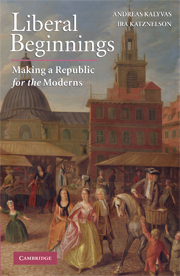Book contents
- Frontmatter
- Contents
- Acknowledgments
- 1 Beginnings
- 2 The Rhetoric of the Market: Adam Smith on Recognition, Speech, and Exchange
- 3 Agonistic Liberalism: Adam Ferguson on Modern Commercial Society and the Limits of Classical Republicanism
- 4 After the King: Thomas Paine's and James Madison's Institutional Liberalism
- 5 Embracing Liberalism: Germaine de Staël's Farewell to Republicanism
- 6 On the Liberty of the Moderns: Benjamin Constant and the Discovery of an Immanent Liberalism
- 7 After Republicanism: A Coda
- Index
- References
3 - Agonistic Liberalism: Adam Ferguson on Modern Commercial Society and the Limits of Classical Republicanism
Published online by Cambridge University Press: 05 September 2012
- Frontmatter
- Contents
- Acknowledgments
- 1 Beginnings
- 2 The Rhetoric of the Market: Adam Smith on Recognition, Speech, and Exchange
- 3 Agonistic Liberalism: Adam Ferguson on Modern Commercial Society and the Limits of Classical Republicanism
- 4 After the King: Thomas Paine's and James Madison's Institutional Liberalism
- 5 Embracing Liberalism: Germaine de Staël's Farewell to Republicanism
- 6 On the Liberty of the Moderns: Benjamin Constant and the Discovery of an Immanent Liberalism
- 7 After Republicanism: A Coda
- Index
- References
Summary
A thinker associated with the republican tradition in the eighteenth century, Adam Ferguson, sometimes labeled a “Machiavellian moralist” or “the last ‘neo-Roman,’” stands out for systematically grappling with the challenge of preserving republican government despite the emergence of modern commercial society. This engagement, understood as an attempt to make republicanism fit for new conditions, has been at the center of important scholarship on Ferguson initiated by J. G. A. Pocock and carried forward by the Cambridge School. It powerfully portrays him as having “modernised republicanism.” This orientation has displaced an older interpretation, famously identified with Friedrich Hayek, which had characterized Ferguson, like Adam Smith, as an early liberal, devoted to free markets, spontaneous orders, and limited governments.
We offer an angular reading. Ferguson, in fact, did struggle to renovate and update republican ideas and values. In so doing, he sought to fashion a politics suitable for what he characterized as a new age of separations. He did not succeed. We will see how each of the three principal solutions he offered, ranging from primarily republican to increasingly liberal, failed to persuasively reconcile virtue and commerce. Yet, in emplacing pluralism, conflict, and sentiments, as well as the role of institutions and laws, at the center of his thinking, Ferguson did more than recast classical republicanism. In highlighting and deploying these features of politics, he pioneered what we can recognize as a distinctive kind of liberalism – not exclusively the economic liberalism sometimes attributed to him, but primarily a political liberalism best understood as agonistic.
- Type
- Chapter
- Information
- Liberal BeginningsMaking a Republic for the Moderns, pp. 51 - 87Publisher: Cambridge University PressPrint publication year: 2008
References
- 2
- Cited by



